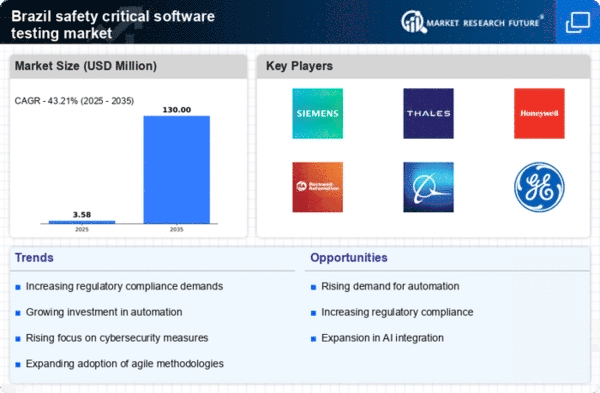Rising Safety Standards
In Brazil, the establishment of stringent safety standards across various industries is significantly influencing the safety critical-software-testing market. Regulatory bodies are increasingly mandating compliance with safety protocols, particularly in sectors like transportation and healthcare. For instance, the National Agency of Civil Aviation has implemented new regulations that require thorough testing of software used in aviation systems. This regulatory environment is expected to propel the market, as companies invest in testing solutions to meet compliance requirements. The safety critical-software-testing market is likely to see a surge in demand as organizations strive to adhere to these evolving standards, ensuring that their software systems are not only functional but also safe for public use.
Growing Demand for Automation
The increasing demand for automation in various sectors is driving the safety critical-software-testing market. Industries such as automotive, aerospace, and healthcare are adopting automated systems to enhance efficiency and reduce human error. In Brazil, the push towards automation is evident, with a reported growth of 15% in the adoption of automated systems in manufacturing alone. This trend necessitates rigorous testing of software to ensure safety and reliability, thereby expanding the market. As companies seek to comply with safety standards, the need for comprehensive testing solutions becomes paramount. The safety critical-software-testing market is thus positioned to benefit from this shift towards automation, as organizations prioritize the integrity of their software systems to mitigate risks associated with automated operations.
Increased Focus on Cybersecurity
The growing emphasis on cybersecurity in Brazil is becoming a pivotal factor for the safety critical-software-testing market. With the rise in cyber threats, organizations are recognizing the need to secure their software systems, particularly those that are safety-critical. This has led to an increased demand for testing services that not only evaluate functionality but also assess security vulnerabilities. The Brazilian government has initiated several cybersecurity initiatives, which further underscores the importance of secure software in critical applications. As companies strive to protect their systems from cyber threats, the safety critical-software-testing market is likely to experience heightened demand for comprehensive testing solutions that encompass both safety and security aspects.
Expansion of the Automotive Sector
The expansion of the automotive sector in Brazil is significantly impacting the safety critical-software-testing market. With the rise of electric and autonomous vehicles, there is a pressing need for rigorous software testing to ensure safety and compliance with regulatory standards. The Brazilian automotive industry has seen a growth rate of approximately 10% in recent years, leading to increased investments in software development and testing. As manufacturers prioritize safety in their vehicle systems, the demand for specialized testing services is expected to rise. This trend indicates a robust opportunity for the safety critical-software-testing market, as companies seek to validate the safety and reliability of their software in an increasingly complex automotive landscape.
Investment in Research and Development
Investment in research and development (R&D) within Brazil is emerging as a crucial driver for the safety critical-software-testing market. Companies are allocating substantial resources to innovate and enhance their software testing capabilities. The Brazilian government has also introduced incentives for tech firms to invest in R&D, which could lead to advancements in testing methodologies and tools. This focus on innovation is likely to result in more effective testing solutions that can address the complexities of safety-critical systems. As organizations seek to improve their software quality and safety, the safety critical-software-testing market stands to gain from these investments, fostering a culture of continuous improvement and technological advancement.
















